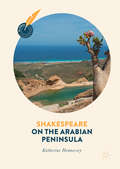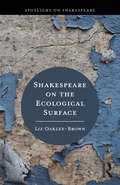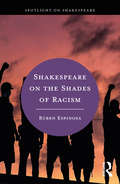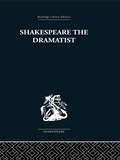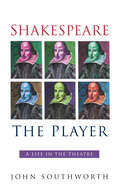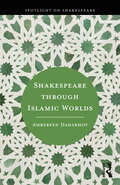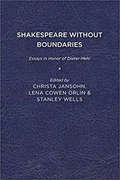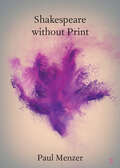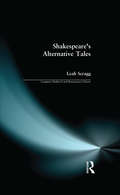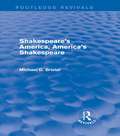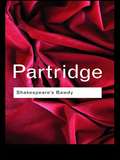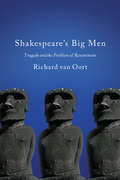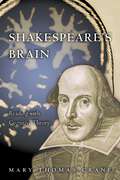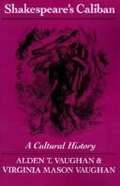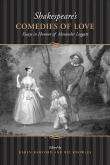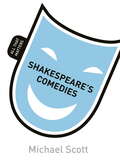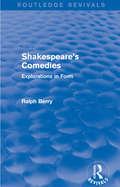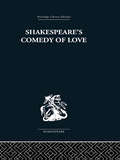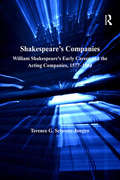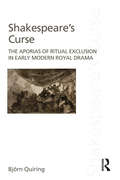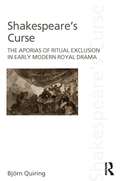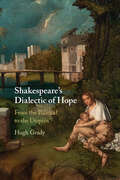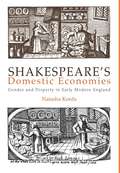- Table View
- List View
Shakespeare on the Arabian Peninsula (Global Shakespeares)
by Katherine HennesseySince the turn of the millennium, the Arabian Peninsula has produced a remarkable series of adaptations of Shakespeare. These include a 2007 production of Much Ado About Nothing, set in Kuwait in 1898; a 2011 performance in Sharjah of Macbeth, set in 9th-century Arabia; a 2013 Yemeni adaptation of The Merchant of Venice, in which the Shylock figure is not Jewish; and Hamlet, Get Out of My Head, a one-man show about an actor’s fraught response to the Danish prince, which has been touring the cities of Saudi Arabia since 2014.This groundbreaking study surveys the surprising history of Shakespeare on the Arabian Peninsula, situating the current flourishing of Shakespearean performance and adaptation within the region’s complex, cosmopolitan, and rapidly changing socio-political contexts. Through first-hand performance reviews, interviews, and analysis of resources in Arabic and English, this volume brings to light the ways in which local theatremakers, students, and scholars use Shakespeare to address urgent regional issues like authoritarianism, censorship, racial discrimination and gender inequality.
Shakespeare on the Ecological Surface (Spotlight on Shakespeare)
by Liz Oakley-BrownShakespeare on the Ecological Surface uses the concept of the ‘surface’ to examine the relationship between contemporary performance and ecocriticism. Each section looks, in turn, at the 'surfaces' of slick, smoke, sky, steam, soil, slime, snail, silk, skin and stage to build connections between ecocriticism, activism, critical theory, Shakespeare and performance. While the word ‘surface’ was never used in Shakespeare’s works, Liz Oakley-Brown shows how thinking about Shakespearean surfaces helps readers explore the politics of Elizabethan and Jacobean culture. She also draws surprising parallels with our current political and ecological concerns. The book explores how Shakespeare uses ecological surfaces to help understand other types of surfaces in his plays and poems: characters’ public-facing selves; contact zones between characters and the natural world; surfaces upon which words are written; and physical surfaces upon which plays are staged. This book will be an illuminating read for anyone studying Shakespeare, early modern culture, ecocriticism, performance and activism.
Shakespeare on the Shades of Racism (Spotlight on Shakespeare)
by Ruben EspinosaShakespeare on the Shades of Racism examines Shakespeare in relation to ongoing conversations that interrogate the vulnerability of Black and brown people amid oppressive structures that aim to devalue their worth. By focusing on the way these individuals are racialized, politicized, policed, and often violated in our contemporary world, it casts light on dimensions of Shakespeare’s work that afford us a better understanding of our ethical responsibilities in the face of such brutal racism. Shakespeare on the Shades of Racism is divided into seven short chapters that cast light on contemporary issues regarding racism in our day. Some salient topics that these chapters address include the murder of unarmed Black men and women, the militarization of the U.S. Mexico border, anti-immigrant laws, exclusionary measures aimed at Syrian refugees, inequities in healthcare and safety for women of color, international trends that promote white nationalism, and the dangers of complicity when it comes to racist paradigms. By bringing these contemporary issues into conversation with a wide range of plays that span the many genres in which Shakespeare wrote throughout his career, these chapters demonstrate how the widespread racism and discord within our present moment stands to infuse with urgent meaning Shakespeare’s attention to the (in)humanity of strangers, the ethics of hospitality, the perils of insularity, abuses of power, and the vulnerability of the political state and its subjects. The book puts into conversation Shakespeare with present-day events and cultural products surrounding topics of race, ethnicity, xenophobia, immigration, asylum, assimilation, and nationalism as a means of illuminating Shakespeare’s cultural and literary significance in relation to these issues. It should be an essential read for all students of literary studies and Shakespeare.
Shakespeare on the University Stage
by Andrew James HartleyFeaturing essays from seventeen international scholars, this exciting new collection is the first sustained study of Shakespeare on the university and college stage. Treating the subject both historically and globally, the essays describe theatrical conditions that fit neither the professional nor the amateur models and show how student performances provide valuable vehicles for artistic construction and intellectual analysis. The book redresses the neglect of this distinctive form of Shakespeare performance, opening up new ways of thinking about the nature and value of university production and its ability to draw unique audiences. Looking at productions across the world - from Asia to Europe and North America - it will interest scholars as well as upper-level students in areas such as Shakespeare studies, performance studies and theatre history.
Shakespeare the Dramatist: And other papers
by Una Ellis-FermorFirst published in 1961. On her death, Professor Ellis-Fermor left behind some uncollected essays and part of a book on Shakespeare the Dramatist. This volume includes the chapters of the unfinished work and three further articles on Shakespeare. It discusses Shakespeare's methods with regard to plot, character, diction, and imagery and it contains comparative analysis of Shakespeare with other dramatists, including Ibsen and Corneille.
Shakespeare the Player: A Life in the Theatre
by John SouthworthTo his contemporaries, Shakespeare was known as an actor, not a playwright, yet this fact has been largely ignored. This title overturns traditional images of the Bard, arguing that Shakespeare cannot be separated from his profession as a player any more than he can be separated from his works.
Shakespeare through Islamic Worlds (Spotlight on Shakespeare)
by Ambereen DadabhoyShakespeare through Islamic Worlds investigates the peculiar absence of Islam and Muslims from Shakespeare’s canon. While many of Shakespeare’s plays were set in the Mediterranean, a geography occupied by Muslim empires and cultures, his work eschews direct engagement with the religion and its people. This erasure is striking given the popularity of this topic in the plays of Shakespeare’s contemporaries. By exploring the limited ways in which Shakespeare uses Islamic and Muslim tropes and topoi, Ambereen Dadabhoy argues that Islam and Muslim cultures function as an alternate or shadow text in his works, ranging from his staged Mediterranean plays to his histories and comedies. By consigning the diverse cultures of the Islamic regimes that occupied and populated the early modern Mediterranean, Shakespeare constructs a Europe and Mediterranean freed from the presence of non-white, non-European, and non-Christian Others, which belied the reality of the world in which he lived. Focusing on the Muslims at the margins of Shakespeare’s works, Dadabhoy reveals that Islam and its cultures informed the plots, themes, and intellectual investments of Shakespeare’s plays. She puts Islam and Muslims back into the geographies and stories from which Shakespeare had evacuated them. This innovative book will be of interest to all those working on race, religion, global and cultural exchange within Shakespeare, as well as people working on Islamic, Mediterranean, and Asian studies in literature and the early modern period.
Shakespeare without Boundaries: Essays in Honor of Dieter Mehl
by David Bevington Adrian Poole Stanley Wells Catherine Belsey Peter Holland Paul Edmondson Brian Gibbons Ann Thompson Piero Boitani R. A. Foakes Ann Jennalie Cook Bruce R. Smith Phyllis Rackin Grace Ioppolo Alan Brissenden Christa Jansohn Velma Bourgeois Richmond Hugh Macrae Richmond Martin Orkin John O. Thompson Alexander Shurbanov Chee-Seng Lim Werner Habicht Marta Gibinska Jesús Tronch Catherine M.S. Alexander Georgianna ZieglerShakespeare without Boundaries: Essays in Honor of Dieter Mehl offers a wide-ranging collection of essays written by an international team of distinguished scholars who attempt to define, to challenge, and to erode boundaries that currently inhibit understanding of Shakespeare, and to exemplify how approaches that defy traditional bounds of study and criticism may enhance understanding and enjoyment of a dramatist who acknowledged no boundaries in art. The Volume is published in tribute to Professor Dieter Mehl, whose critical and scholarly work on authors from Chaucer through Shakespeare to D. H. Lawrence has transcended temporal and national boundaries in its range and scope, and who, as Ann Jennalie Cook writes, has contributed significantly to the erasure of political boundaries that have endangered the unity of German literary scholarship and, more broadly, through his work for the International Shakespeare Association, to the globalization of Shakespeare studies. Published by University of Delaware Press. Distributed worldwide by Rutgers University Press.
Shakespeare without Print (Elements in Shakespeare Performance)
by Paul MenzerEverything we know about Shakespeare – his world, his words, his work – is preconceived by print. This knowledge extends to cultural expressions that seek to evade ink, paper, and moveable type, such as performance, such as acting. Print privileges qualities quite alien to performance, however: standardization, reproducibility, and, above all, uniformity. Thus the master tropes of print occlude rather than clarify our thinking about acting. How might we think about Shakespeare and performance without print? Examining texts both early and modern, Shakespeare without Print contends that Shakespeare and performance has long been dominated by a medium alien to its expression, print, a foreign government that forecloses alternative conceptualizations and practices. Through a series of discrete but linked excursions into the relationship between Shakespearean print and Shakespearean performance, this Element auditions alternative prepositions to enfranchise scholars and practitioners from print, which currently binds and determines our various approaches to Shakespearean performance.
Shakespeare's Alternative Tales (Longman Medieval and Renaissance Library)
by Leah ScraggA knowledge of the history and evolution of the tales on which Shakespeare drew in the composition of his plays is essential for the understanding of his work. In re-telling a particular story, a Renaissance writer was not simply reshaping the structure of the narrative but participating in a species of debate with earlier writers and the meanings their tales had accrued. The stories upon which Shakespeare's plays are constructed did not descend to him as innocent collections of incidents, but brought with them considerable cultural baggage, substantially lost to the modern spectator but an essential component, for a contemporary audience, of the meaning of the work.Shakespeare's Alternative Tales explores this literary dialogue, focusing on those plays in which the expectations generated by an inherited story are in some way overthrown, setting up a tension for a Renaissance spectator between 'received' and 'alternative' readings of the text. Each chapter opens with a familiar story, supplying a context for the subsequent discussion, and exhibits the way in which the dramatist's reworking of a traditional motif interrogates the assumptions implicit in his source.While offering the twentieth-century reader a fresh perspective from which to view the plays, the approach also supplies an introduction to contemporary readings of the Shakespearean canon. The tales Leah Scragg considers may be seen as 'alternative' in more than one sense: they radically rework conventional situations, while lending themselves to analysis in terms of new critical methodologies.The text will be of interest to both students of Shakespeare and the general reader. In conjunction with the author's companion volume, Shakespeare's Mouldy Tales, it provides an ideal introduction to contemporary developments in source studies.
Shakespeare's America, America's Shakespeare: Literature, Institution, Ideology In The United States (Routledge Revivals)
by Michael D. BristolFirst published in 1990, this title explores the nature of the interaction between Shakespeare and American culture. Shakespeare stands at the center of an elaborate institutional reality, closely tied to both cultural and ideological production. His plays, Michael Bristol asserts, help to constitute a primary affirmative theme of much American culture criticism, specifically the celebration of individuality and the values of expressive autonomy. This reissue will be of particular value to Literature students and researchers with an interest in Shakespeare, as well as those interested in American cultural history more generally.
Shakespeare's Bawdy (Routledge Classics)
by Eric PartridgeThis classic of Shakespeare scholarship begins with a masterly introductory essay analysing and exemplifying the various categories of sexual and non-sexual bawdy expressions and allusions in Shakespeare's plays and sonnets. The main body of the work consists of an alphabetical glossary of all words and phrases used in a sexual or scatological sense, with full explanations and cross-references.
Shakespeare's Big Men: Tragedy and the Problem of Resentment
by Richard Van OortShakespeare's Big Men examines five Shakespearean tragedies - Julius Caesar, Hamlet, Othello, Macbeth, and Coriolanus - through the lens of generative anthropology and the insights of its founder, Eric Gans. Generative anthropology's theory of the origins of human society explains the social function of tragedy: to defer our resentment against the "big men" who dominate society by letting us first identify with the tragic protagonist and his resentment, then allowing us to repudiate the protagonist's resentful rage and achieve theatrical catharsis.Drawing on this hypothesis, Richard van Oort offers inspired readings of Shakespeare's plays and their representations of desire, resentment, guilt, and evil. His analysis revives the universal spirit in Shakespearean criticism, illustrating how the plays can serve as a way to understand the ethical dilemma of resentment and discover within ourselves the nature of the human experience.
Shakespeare's Brain: Reading with Cognitive Theory
by Mary Thomas CraneHere Mary Thomas Crane considers the brain as a site where body and culture meet to form the subject and its expression in language. Taking Shakespeare as her case study, she boldly demonstrates the explanatory power of cognitive theory--a theory which argues that language is produced by a reciprocal interaction of body and environment, brain and culture, and which refocuses attention on the role of the author in the making of meaning. Crane reveals in Shakespeare's texts a web of structures and categories through which meaning is created. The approach yields fresh insights into a wide range of his plays, including The Comedy of Errors, As You Like It, Twelfth Night, Hamlet, Measure for Measure, and The Tempest. ? Crane's cognitive reading traces the complex interactions of cultural and cognitive determinants of meaning as they play themselves out in Shakespeare's texts. She shows how each play centers on a word or words conveying multiple meanings (such as "act," "pinch," "pregnant," "villain and clown"), and how each cluster has been shaped by early modern ideological formations. The book also chronicles the playwright's developing response to the material conditions of subject formation in early modern England. Crane reveals that Shakespeare in his comedies first explored the social spaces within which the subject is formed, such as the home, class hierarchy, and romantic courtship. His later plays reveal a greater preoccupation with how the self is formed within the body, as the embodied mind seeks to make sense of and negotiate its physical and social environment.
Shakespeare's Caliban: A Cultural History
by Alden T. Vaughan; Virginia Mason VaughanShakespeare's Caliban examines The Tempest's "savage and deformed slave" as a fascinating but ambiguous literary creation with a remarkably diverse history. The authors, one a historian and the other a Shakespearean, explore the cultural background of Caliban's creation in 1611 and his disparate metamorphoses to the present time.
Shakespeare's Comedies of Love
by Karen BamfordBorrowing its title from renowned scholar Alexander Leggatt's landmark 1974 study, Shakespeare's Comedies of Love is a tribute to a critic who has shaped the way the world understands Shakespeare and his comedies. To help celebrate his distinguished career as a teacher and scholar, this collection of essays presents a wide range of new work on the Bard's comedies. The contributors cover diverse areas of inquiry, including the use of the comedies as a source of women's empowerment in nineteenth-century America; civic drama in Elizabethan London; male anxiety about women in the comedies; anti-Semitism in The Merchant of Venice; as well as some key productions of Shakespeare's comedies. Rich in detail and broad in scope, Shakespeare's Comedies of Love is a celebration of Leggatt's distinguished career, and an enduring collection of work on the world's most famous writer.
Shakespeare's Comedies: All That Matters (All That Matters)
by Michael ScottIn Shakespeare's Comedies: All That Matters, Mike Scott explores and explains the secrets that have made Shakespeare's comedies so enduring that they continue to be performed, watched and studied by millions of people every year. Professor Scott focuses in turn on The Comedy of Errors, A Midsummer Night's Dream, Twelfth Night, As You Like It and The Merchant of Venice and builds an argument based around Shakepeare's use of language to prompt the audience's imagination and thought. This original little book, and its companion volume Shakespeare's Tragedies, fills a major gap in the market for a book which will enable readers to understand a Shakesperean play in the context of its ouevre.This accessible and readable book will appeal both to students and general readers, giving a fascinating intoruduction to Shakespeare's comedies - and what matters most about them."'Comedy is a serious business' says Michael Scott - it is, and his splendid short book takes it very seriously as it should, but remains lively and wonderfully readable withall." Dr Drummond Bone, Master of Balliol College, Oxford"An authoritative and expert overview of the entire fields of Shakespearean Comedy and Tragedy combined with persuasive and eminently accessible close readings of particular plays. Michael Scott brings to the task and infectious enthusiasm and deep knowledge of their theatrical, literary and cultural significance and he provides a clear and compelling endorsement of their continued relevance. These books provide an exemplary introduction to the complex world of Shakespearean drama, full of insights, observations, and ideas, all of which are brought firmly to bear on the abiding question of what these plays mean for us today." John Drakakis, Professor of English at the University of Stirling"Everything is so clear - no academic jargon, for instance. With Shakespeare's Comedies, even the most critical scholars can learn something... as well as students at the start of their encounter with Shakespeare and the same for regular theatre goers. To address all three at once... has to be an accomplishment... from the Introduction to the Conclusion... to the last sentence: (the) reader will readily grasp why this series of books is called All That Matters." Professor M.L.Wine, Evanston, USA
Shakespeare's Comedies: All That Matters (Atm Ser.)
by Mike ScottIn Shakespeare's Comedies: All That Matters, Mike Scott explores and explains the secrets that have made Shakespeare's comedies so enduring that they continue to be performed, watched and studied by millions of people every year. Professor Scott focuses in turn on he Comedy of Errors, A Midsummer Night's Dream, Twelfth Night, As You Like It and The Merchant of Venice and builds an argument based around Shakepeare's use of language to prompt the audience's imagination and thought. This original little book, and its companion volume Shakespeare's Tragedies, fills a major gap in the market for a book which will enable readers to understand a Shakesperean play in the context of its ouevre. This accessible and readable book will appeal both to students and general readers, giving a fascinating intoruduction to Shakespeare's comedies - and what matters most about them.
Shakespeare's Comedies: Explorations in Form (Routledge Revivals)
by Ralph BerryIn this lucid and original study, first published in 1972, Ralph Berry discusses the ten comedies that run from The Comedy of Errors to Twelfth Night. Berry’s purpose is to identify the form of each play by relating the governing idea of the play to the action that expresses it. To this end the author employs a variety of standpoints and techniques, and taken together, these chapters present a lively and coherent view of Shakespeare’s techniques, concerns, and development. This title will be of interests to students of literature and drama.
Shakespeare's Comedy of Love
by Alexander LeggattFirst published in 1987. This study removes some of the critical puzzles that Shakespeare's comedies of love have posed in the past. The author shows that what distinguishes the comedies is not their similarity but their variety - the way in which each play is a new combination of essentially similar ingredients, so that, for example, the boy/girl changes in The Merchant of Venice are seen to have a quite different significance from those in As You Like It.
Shakespeare's Companies: William Shakespeare's Early Career and the Acting Companies, 1577–1594 (Studies In Performance And Early Modern Drama Ser.)
by Terence G. Schoone-JongenFocusing on a period (c.1577-1594) that is often neglected in Elizabethan theater histories, this study considers Shakespeare's involvement with the various London acting companies before his membership in the Lord Chamberlain's Men in 1594. Locating Shakespeare in the confusing records of the early London theater scene has long been one of the many unresolved problems in Shakespeare studies and is a key issue in theatre history, Shakespeare biography, and historiography. The aim in this book is to explain, analyze, and assess the competing claims about Shakespeare's pre-1594 acting company affiliations. Schoone-Jongen does not demonstrate that one particular claim is correct but provides a possible framework for Shakespeare's activities in the 1570s and 1580s, an overview of both London and provincial playing, and then offers a detailed analysis of the historical plausibility and probability of the warring claims made by biographers, ranging from the earliest sixteenth-century references to contemporary arguments. Full chapters are devoted to four specific acting companies, their activities, and a summary and critique of the arguments for Shakespeare's involvement in them (The Queen's Men, Strange's Men, Pembroke's Men, and Sussex's Men), a further chapter is dedicated to the proposition Shakespeare's first theatrical involvement was in a recusant Lancashire household, and a final chapter focuses on arguments for Shakespeare's membership in a half dozen other companies (most prominently Leicester's Men). Shakespeare's Companies simultaneously opens up twenty years of theatrical activity to inquiry and investigation while providing a critique of Shakespearean biographers and their historical methodologies.
Shakespeare's Curse
by Bjoern QuiringConceptualizing the curse as the representation of a foundational, mythical violence that is embedded within juridical discourse, Shakespeare’s Curse pursues a reading of Richard III, King John, and King Lear in order to analyse the persistence of imprecations in the discourses of modernity. Shakespeare wrote during a period that was transformative in the development of juridical thinking. However, taking up the relationship between theatre, theology and law, Bjoern Quiring argues that the curse was not eliminated from legal discourses during this modernization of jurisprudence; rather, it persisted and to this day continues to haunt numerous speech acts. Drawing on the work of Derrida, Lacan, Walter Benjamin and Giorgio Agamben, among others, Quiring analyses the performativity of the curse, and tracks its power through the juristic themes that are pursued within Shakespeare’s plays – such as sovereignty, legitimacy, succession, obligation, exception, and natural law. Thus, this book provides an original and important insight into early modern legal developments, as well as a fresh perspective on some of Shakespeare’s best-known works. A fascinating interdisciplinary study, this book will interest students and scholars of Law, Literature, and History.
Shakespeare's Curse: The Aporias of Ritual Exclusion in Early Modern Royal Drama
by Björn QuiringConceptualizing the curse as the representation of a foundational, mythical violence that is embedded within juridical discourse, Shakespeare’s Curse:The Aporias of Ritual Exclusion in Early Modern Royal Drama pursues a reading of Richard III, King John, and King Lear in order to analyse the persistence of imprecations in the discourses of modernity. Shakespeare wrote during a period that was transformative in the development of juridical thinking. However, taking up the relationship between theater, theology and law, Björn Quiring argues that the curse was not eliminated from legal discourses during this modernization of jurisprudence; rather, it persisted and to this day continues to haunt numerous speech acts. Drawing on the work of Derrida, Lacan, Walter Benjamin and Giorgio Agamben, among others, Quiring analyses the performativity of the curse, and tracks its power through the juristic themes that are pursued within Shakespeare’s plays – such as sovereignty, legitimacy, succession, obligation, exception, and natural law. Thus, this book provides an original and important insight into early modern legal developments, as well as a fresh perspective on some of Shakespeare’s best known works. A fascinating interdisciplinary study, this book will interest students and scholars of Law, Literature, and History.
Shakespeare's Dialectic of Hope: From the Political to the Utopian
by Hugh GradyClosely examining the relationship between the political and the utopian in five major plays from different phases of Shakespeare's career, Hugh Grady shows the dialectical link between the earlier political dramas and the late plays or tragicomedies. Reading Julius Caesar and Macbeth from the tragic period alongside The Winter's Tale and Tempest from the utopian end of Shakespeare's career, with Antony and Cleopatra acting as a transition, Grady reveals how, in the late plays, Shakespeare introduces a transformative element of hope while never losing a sharp awareness of suffering and death. The plays presciently confront dilemmas of an emerging modernity, diagnosing and indicting instrumental politics and capitalism as largely disastrous developments leading to an empty world devoid of meaning and community. Grady persuasively argues that the utopian vision is a specific dialectical response to these fears and a necessity in worlds of injustice, madness and death.
Shakespeare's Domestic Economies: Gender and Property in Early Modern England
by Natasha KordaShakespeare's Domestic Economies explores representations of female subjectivity in Shakespearean drama from a refreshingly new perspective, situating The Taming of the Shrew, The Merry Wives of Windsor, Othello, and Measure for Measure in relation to early modern England's nascent consumer culture and competing conceptions of property. Drawing evidence from legal documents, economic treatises, domestic manuals, marriage sermons, household inventories, and wills to explore the realities and dramatic representations of women's domestic roles, Natasha Korda departs from traditional accounts of the commodification of women, which maintain that throughout history women have been "trafficked" as passive objects of exchange between men.In the early modern period, Korda demonstrates, as newly available market goods began to infiltrate households at every level of society, women emerged as never before as the "keepers" of household properties. With the rise of consumer culture, she contends, the housewife's managerial function assumed a new form, becoming increasingly centered around caring for the objects of everyday life—objects she was charged with keeping as if they were her own, in spite of the legal strictures governing women's property rights. Korda deftly shows how their positions in a complex and changing social formation allowed women to exert considerable control within the household domain, and in some areas to thwart the rule of fathers and husbands.
